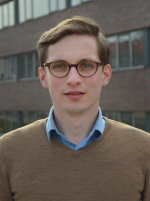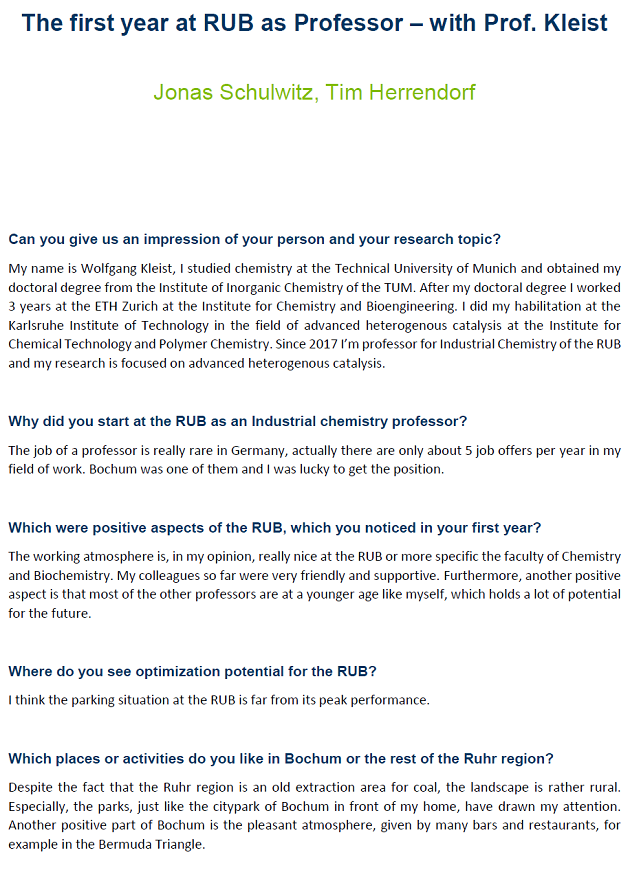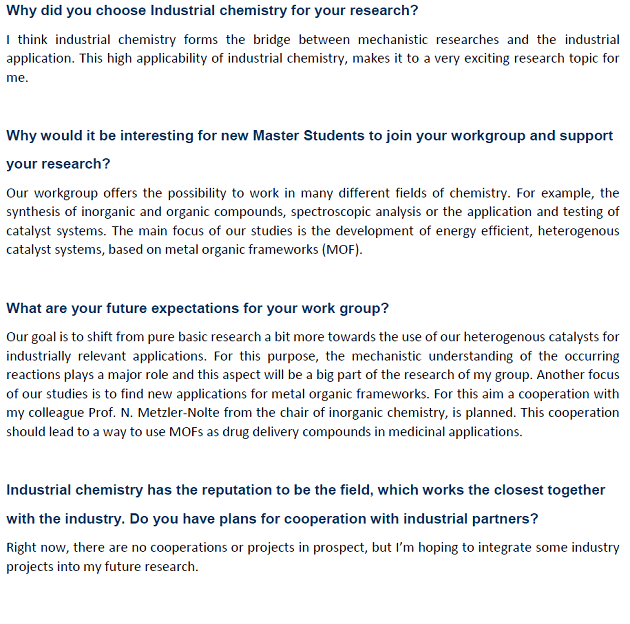Articles and Interviews
Articles and Interviews 2020
Interview with Prof. Dr. Borchardt

Before Prof. Dr. Lars Borchardt came to the RUB in 2019, he was in charge of the “Mechanocarb” junior research group at the Technical University of Dresden, which was funded by the Federal Ministry of Education and Research as part of the “Materialforschung für die Energiewende” funding initiative.
His mechanochemistry research group at the RUB is working on the development of new synthesis routes for nanostructured materials completely avoiding solvents.
For the winter semester 2019/20 Prof. Dr. Borchardt developed the lecture “Green and Sustainable Chemistry”.
We interviewed him and talked to him about green chemistry:
We hope that you settled in well in Bochum. How do you like it here? What characterises the university and the city?
I like it a lot in Bochum. I like the city, and I have friends here. Therefore it wasn’t a big adjustment to move here from Dresden. Also, everything runs smoothly at the university. I was very lucky to get a pretty full group of friendly new people pretty quickly. Furthermore, the lab courses are always well attended, which shows that there is an interest in our field of research. One thing that I found very positive at the RUB is that the student council of the faculty for Chemistry and Biochemistry (Fachschaft Chemie/Biochemie) is very active here. This commitment is unknown to me from any other university.
What do you particularly like about the city Bochum or the university?
I know that people always talk about the architecture of this university. There are surely very controversial opinions on this topic. I think I belong to that group of people that actually likes the architectural style of Brutalism. On a weekend, when you walk over the campus and there is no one else around, there is a certain charm to it.
How did you come up with the topic of “Green Chemistry and Sustainability“ as a lecture?
On the one hand, the topic is close to hand due to our research. Mechanochemistry pursues the goal of “sustainability” by trying to avoid solvents. This is the reason why I am involved in this topic. On the other hand, it annoyed me that the word “sustainable” has become a trendy word and is used everywhere. Many publications in technical literature state that a sustainable synthesis has been carried out. Therefore I think it makes sense for students to look into what “sustainability” means. After all, it doesn’t mean that I pick out one small thing and improve it but take no heed of everything else. In the end, I may have no effective improvement of the synthesis whatsoever. It’s important that students learn this in a timely manner. Especially in academics I came to realise that often one only asks “how can I improve something?”, “how can I create a new active ingredient?”. Yet, it is never sufficiently asked “at what price and in what way can I achieve improvements or innovations?”. It should also be questioned “how can I produce existing materials differently?”. This is as important a question as the question of new materials. Perhaps this question is even more important.
Why is Green Chemistry so important?
Us chemists and the chemical industry, in which many of us are employed, are involved in environmental pollution and consequently climate change. It’s something that one has heard somewhere before, but one isn’t aware of to the same extent in one’s academic studies. This is the reason why the awareness of this topic and the responsibility needs to be raised among students.
There are alternative synthesis routes. This fails to be done either because we do not yet know about alternatives, because they have not yet been considered, or because we are too lazy or too arrogant to search for alternatives.
What is your personal motivation to speak up for the topic?
I consider holistic thinking to make sense. Not only one detail should be improved in order to neglect everything else at the cost of it. My personal motivation for myself and the students is to promote this holistic way of thinking and to ask oneself the questions “what does this synthesis route actually cause and which alternatives are there?” and “where do I stand with my actions and deeds as a chemist in society?”. Contextualisation of oneself, ones work and ones actions is very important in my opinion.
When I was working up the lecture, I noticed some things about my own research, which I had never thought about before. Thus, I was able to discover potential for improvement in some areas. Sometimes one just needs to be pushed and be sensitized. I am happy to pass on these insights.
The RUB is one site of the Cluster of Excellence RESOLV, which deals with solvents. One goal of RESOLV is to study the effect of solvents, e.g. the influence of solvation processes. In many synthesis routes the solvent plays a decisive role. Regardless, the not-anymore-needed solvents are one of the biggest waste producers.
How do you evaluate that sustainability in synthesis could be improved by solvent research?
It may appear to be contradictory that someone who bans solvents from his lab has been appointed to a university that positions itself by running solvent research. But it’s only a contradiction at first glance, because it is very helpful to be able to perform chemical syntheses without solvents in order to understand what the solvent actually does. It is very helpful to be able to perform chemical syntheses solvent-free in order to estimate the role of the solvent.
Solvents aren’t bad per se. Chemistry in nature is based on water as solvent. It wouldn’t make sense to want to ban water from our lives by all costs. It’s nonsense and that’s not the point. It is about being able to substitute hazardous, toxic and environmentally harmful solvents like halogenated organic solvents. This substitution by a green solvent such as water would be an acceptable solution.
I think that solvent research is useful for the improvement of sustainability in synthesis. There are many examples for organic syntheses, which were at first performed in halogenated organic solvents and can now also be carried out in water. Once the concept of how a particular molecule is solvated is understood, it can be estimated whether this solvation would also be possible in other solvents. For this insight we need solvent research.
How realistic is it to completely avoid solvents?
In the field of mechanochemistry, the last two decades have shown that virtually every typical name reaction known from organic chemistry can be carried out solvent free. Many hyped materials like metal-organic frameworks, graphene or materials for electrodes for batteries can be produced solvent-free. This convinces me that there is no fundamental barrier to perform syntheses without solvent. The question arises again of the necessity to reduce used solvents, to replace toxic solvents with less toxic ones, and to avoid solvents all together. Time will tell to which extent these aims will be implemented successively or in parallel.
Therefore, no fundamental restrictions get in the way of avoiding of solvents. Yet, the economic side still plays a significant part in the implementation.
Thanks a lot to Prof. Dr. Borchardt for his immediate willingness to be interviewed, his time and his detailed and informative answers.
The interview was conducted by Katharina Blanke and Larissa Schaper.
-
Borchardt-Group
If you are interested in further information about Prof. Dr. Borchardt's research area, please visit his website.
Find here Articles and Interviews from the previous years


Interview with Prof. Martin Muhler
Interview: Tobias Falk; Nils Hendrik Mohrbach
Prof. Martin Muhler is chairholder for industrial chemistry at our University. He studied chemistry at the Ludwig-Maximilian University in Munich from 1980-1986. He did his Ph. D. at the Freie University Berlin in 1986 and qualified as a professor at the Technische University Berlin in 1989. Since 1996 he is professor at the Ruhr-University Bochum. We had the opportunity to ask him some questions.
Why did you choose to study chemistry?
I was fascinated by performing chemical experiments using the “Kosmos Experimentierkasten”.
What would you have done, if you had not studied chemistry?
Actually, physics would have been an interesting alternative.
Would you recommend to your children to study chemistry (given they have qualified)?
Yes, of course, but for them it is not interesting.
If you would have to re-decide for another specialization and heterogeneous catalysis was not available, which would you choose?
Long time ago I was also interested in storing information using holograms.
What was the best moment/ experience during your study time?
At the LMU Munich the diploma consisted of oral examinations in inorganic, organic and physical chemistry and the chosen topic. All these examinations took place within two weeks, which was a frightening situation for all students. The best moment was when I realized that it is indeed an incredible amount of knowledge to be acquired, but this knowledge is linked! In this way, based on the deeper understanding of the various connections between all the fields of chemistry, it was possible for me to pass all of them successfully.
Why did you choose to become a professor?
During my postdoc years in a Danish engineering company, I realized that I am not suitable for a job in industry. Luckily, my former professor offered me a group leader position and the option to work on a habilitation thesis.
Do you sometimes miss the work in the lab?
Very rarely. I am afraid that I became too impatient for the time-consuming lab work.
Is there a special reason why you chose Bochum as your workplace?
It is the full truth that I had to find out first where Bochum is precisely located, when I got the information that there is vacant professorship in Technical Chemistry. I had known that is located in the Ruhr area, but I was not aware at that time that it is located between Dortmund and Essen.
What within the area of heterogenous catalysis fascinates you the most?
Every progress made in heterogeneous catalysis helps to use resources more efficiently. In this way, economic and ecologic progress go hand in hand.
Which research result are you most proud of?
I have always been working on many different topics. Thus, I am always proud of deeper insights in how catalysts work, which lead to knowledge-based improvements.
Which research of any other group got your special interest and why?
As stated before, my research is very broad covering syngas catalysts, electro- and photocatalysis, but also more classical topics such as selective hydrogenation and oxidation. I do my best to keep up with the leading groups in all these fields.
Imagine you had one chance to change a thing here at this university, what would you choose?
I would completely restructure the present fragmented administration system, which is inefficiently shuffling tasks between the central administration, the departments, and the chairs.
If you could give an advice for a freshmen student, what would it be?
Never stop asking “why?” questions, because this is the only way to achieve deeper insight.
The failure rate in scientific bachelor courses is about 40 % (http://www.dzhw.eu/pdf/pub_fh/fh-201404.pdf), thus representing the pole position among all major courses. What should be done to improve the preparation of future science students at schools?
They need a thorough education in mathematics and physics. Without that education it is highly likely that they will fail too early in their Bachelor courses.
You worked in Denmark for two years after your PhD Thesis. Did you gather any special experiences there which you still keep in mind?
I still like to spend my holidays in Denmark, and I am still able to read Danish and to understand a slowly spoken conversation. It is a deeply rooted fascination of the Nordic culture.
Interview with Prof. Dr. Schuhmann
Download the interview as a PDF:
Interview with Prof. Dr. Schuhmann
(2.9 MB)


